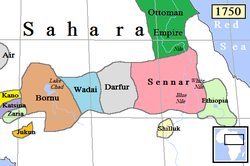Sennar (sultanate)
| The Blue Sultanate / Funj Sultanate | ||||||||||
| السلطنة الزرقاء (Arabic) As-Saltana az-Zarqa |
||||||||||
| Confederation of sultanates and dependent tribal chieftaincies under Sennar's suzerainty | ||||||||||
|
||||||||||
|
Sultanate of Sennar (in pink) and surrounding states in 1750
|
||||||||||
| Capital | Sennar | |||||||||
| Languages | Arabic | |||||||||
| Religion | African Traditional Religion, Islam | |||||||||
| Government | Monarchy | |||||||||
| Mek (sultan) | ||||||||||
| • | 1504–1533/4 | Amara Dunqas (first) | ||||||||
| • | 1805–1821 | Badi VII (last) | ||||||||
| Legislature | Great Council | |||||||||
| Historical era | Early modern period | |||||||||
| • | Established | 1504 | ||||||||
| • | Conquered by Muhammad Ali's army | 14 June 1821 | ||||||||
| • | Annexed to Egypt | 13 February 1841 | ||||||||
| Population | ||||||||||
| • | 1820 est. | 5,156,000 | ||||||||
| Currency | None (barter) | |||||||||
|
||||||||||
|
^ a. Muhammad Ali was granted the non-hereditary governorship of Sudan by an 1841 Ottoman firman.
^ b. Estimate for entire area covered by modern Sudan. ^ c. The Funj Sultanate did not mint coins and the markets did not use coinage as a form of exchange. French surgeon J. C. Poncet, who visited Sennar in 1699, mentions the use of foreign coins such as Spanish reals. |
||||||||||
^ b. Estimate for entire area covered by modern Sudan.
^ c. The Funj Sultanate did not mint coins and the markets did not use coinage as a form of exchange. French surgeon J. C. Poncet, who visited Sennar in 1699, mentions the use of foreign coins such as Spanish reals.
The Funj Sultanate of Sennar (sometimes spelled Sinnar), known in Sudanese traditions as the Blue Sultanate, because of the Sudanese convention of referring to black peoples as blue (Arabic: السلطنة الزرقاء; As-Saltana az-Zarqa), was a sultanate in the north of Sudan, named Funj after the ethnic group of its dynasty or Sinnar (or Sennar) after its capital, which ruled a substantial area of northeast Africa between 1504 and 1821.
In the 15th century the part of Nubia previously controlled by Makuria was home to a number of small states and subject to frequent incursions by desert nomads. The situation in Alodia is less well known, but it also seems as though that state had collapsed. The area was reunified under Abdallah Jamma, the gatherer, who came from the eastern regions that had grown wealthy and powerful from the trade on the Red Sea. To him is ascribed the capture of Soba, which sank into unimportance: according to Reubeni, in the time of ‘Amara Dunqas it was in ruins. ‘Abdallah’s status as Muslim hero is confirmed by traditions representing him marrying the daughter of a Hijazi holy man called Alshikh Hamd Abou Dunana who was burned in Abu Delaig, and as the eponymous ancestor of the ruling clan, the ‘Abdallab.
Abdallah's empire was short lived as in the early 16th century the Funj people under Amara Dunqas arrived from the south, having been driven north by the Shilluk. The Funj defeated Abdallah and set up their own kingdom based at Sennar.
...
Wikipedia

